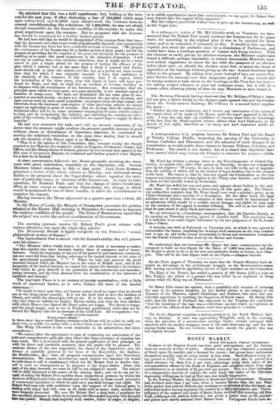The morning journals receive Sir Robert Peers great scheme with
various affections, but upon the whole they admire. The Ministerial Herald is highly eulogistic on the Premier's "sound,
philosophical system of finance." • The Agricultural Post is struck with Sir Robert's abilityllmt still grieves over hie errors--
*" The Minister either:wholly forgot, or did not think it necessary to notice, that this country has other interests besides those of commerce and of manu- factures. From the beginning to the end of his powerful And luminous statement, not one word fell from him having reference to the landed interest ar the state of
the agricultural population. • When we take into account the great personal interest which the Minister has in the value of British land, and in the prosperity of the landed interest, we cannot but admire the dauntless devotedness with which he gives himself to the promotion of the commercial and manufac- turing interests, and the total absence from his consideration of the interests of landlords and farmers."
The wayward Times is in an eestacy ofjocular approbation; with a little wink of equivocal banter, as it were, behind the buck of the lauded statesman— "It would be hard upon him, and human nature itself, to expect that he should notate the thine. rather grandly. It is net his fault that he acts the Goddess of Plenty, and wields his cornucopia with an air. It is his mission to confer feli- city; and when he unfolds his budget, Nature smiles, and even the four children with which Heaven has blessed the Royal union are happy. The Queen is happy, and the people happy, and so too is Parliament, particularly when they are in- formed her Majesty asks for no increase of the Civil List. All is happiness; but
" medic de fonts leporum Sunfit &marl atioutd."
In three short days—next Monday evening—the House will be called on, with one short vote, to saddle the nation with a second three years of the Income-tax." The Whig Chronicle is the 'most emphatic in its admiration, but hints exceptions- " We cannot allow the opportunity to pass of expressing our admiration of the bold-and comprehensive principle upon which this large remission of taxation has been made. Nor is it so much with the present application of that principle, as with its direct and inevitable tendency, that the public will be pleased. The ominous silence of his own supporters, the cheers of the Opposition, and the dismay so painfully pictured in the faces of the Knightleys, the Inglises, the Rushbrookes; &c., were all pregnant commentaries upon this Free-trade demonstration. We cannot, however, too much deplore the obstinacy it would be ridiculous to call it consistency) which led .Sir Robert Peel to involve him- self in such an arrangement as he proposes of the Sugar_duties. From this part of his plan, however, we trust he will be yet obliged to recede. The subject will be folly discussed in the course of the ensuing week; and we do not yet de- spair of seeing Sir Robert Peel sacrifice those hypocritical pretexts by which the markets of Brazil and Cuba are threatened to be closed, to those sound principles of commercial legislation to which he paid such practical homage last night. Sir Robert Peel may rely with confidence upon the support of the Liberal peaty in dealing with sugar and with corn as he deals with so many other articles that were fernier-1y protected. We owe Sir Robert Peel a deep debt of gratitude for the excellent purposes to which he is turning the Monopolist majority who brought him into power. Should that majority turn restive,_ either in anger, in disgust, or in selfish apprehesedon About their own interests. we say again, Sir Robert-Peet may depend upon the support of his opponents."
But the exigent journalist wishes him to give up the Income-teut, as well as the Sugar plan.


























 Previous page
Previous page